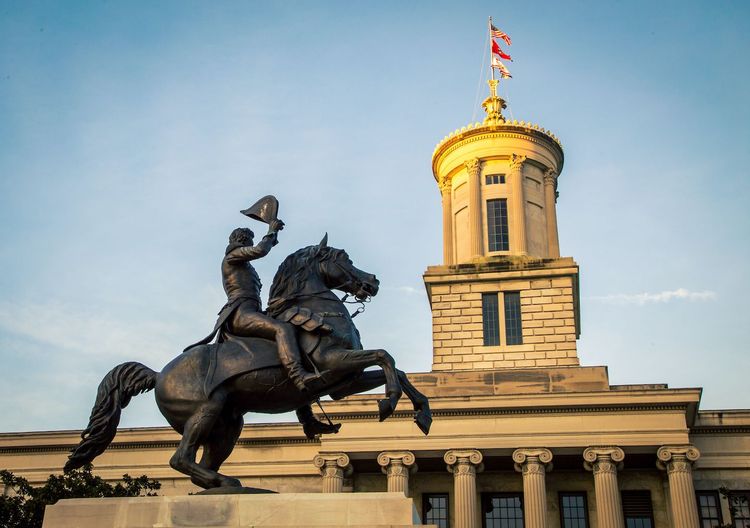Exploring Nashville's Top 7 Historical Neighborhoods to Call Home

Looking to reside in a historic neighborhood? You’ve come to the right city! Nashville is home to several beautiful areas that harbor some of Tennessee’s most fascinating history and architecture. Take a glance at our Top 7 choices for the most notable historic neighborhoods near Nashville.
What Makes a Neighborhood Historical?
In this article, we’ve considered 3 factors that are integral to a neighborhood’s historicity.
1. The neighborhood has been (or soon will be) an officially registered historic area. Areas that are listed on the National Register of Historic Places, or otherwise registered as a historic district, are faithfully protected and preserved by the community.
2. The neighborhood is home to several notable historic sites. Most of the neighborhoods on this list feature prominent areas that are essential to Tennessee’s history. Most of these landmark sites have been restored and transformed into museums that are open to the public.
3. The majority of the neighborhood’s architecture dates back several hundred years. Sections of the neighborhoods we’re highlighting all feature beautiful, ornate homes built in the 1800s that have been lovingly restored. From Victorian to Colonial Revival, there are a fascinating variety of architectural styles to study in Nashville's historic neighborhoods.
Franklin
Founded in 1799 and named after Benjamin Franklin, this neighborhood is a favorite of Nashville’s local history buffs. Brimming with civil war history, Franklin includes well-known historic sites such as Carnton Plantation, Carter House, Lotz House Museum, and McGavock Confederate Cemetery.
In the 1960s, Franklin’s unique history was threatened by the rapid development of the Nashville area, especially by I-65’s construction. Thankfully, residents rallied to place a 16-block section on the National Register of Historic Places. While Franklin continues to be developed into a charming suburban sanctuary, its historical integrity and architecture is still protected and preserved.
Many of Franklin’s homes are artfully designed and harbor complex histories. The Watson House, designed by the architect who constructed the Ryman Auditorium, is a notable example that attracts both tourists and locals. Some of Franklin’s houses are preserved as close to its original design as possible, such as the ornate Eggleston Place, while others have been repurposed into clever attractions (as with the Corn House’s transformation into the popular restaurant, Biscuit Love).
PRO TIP: See historic homes for sale in Franklin
Germantown
Nashville’s first suburb and one of the oldest suburbs on this list, Germantown was officially established in the 1850s as primarily an industrial worktown after the McGavock brothers purchased thousands of acres in 1786, eventually selling much of it off to slowly develop into this urban area. Named after the large influx of European immigrants - particularly from Germany - the Germantown neighborhood has always been known for its diversity.
Many of Germantown’s current buildings were constructed as far back as the 1830s, and range from stylings of worktown brick buildings to Victorian-influenced architecture. Germantown began its renovation of the neighborhoods, starting with its historic churches, in the 1970s. Since then, the neighborhood continues to be preserved and protected.
Registered as a Historic District in 1979, Germantown is also home to over 100 species of trees, officially designating this neighborhood as a city arboretum by the Nashville Tree Foundation.
Want to delve more in-depth into the detailed history of this neighborhood? Click here for more!
PRO TIP: See homes for sale in Germantown
East Nashville
This plucky little historic neighborhood, established in 1876, has survived quite a lot - 3 tornadoes to be exact! East Nashville’s first trial occurred with the Great Fire of 1916. The area was again devastated in both 1993 and 1998 by catastrophic tornadoes. In 2020, this neighborhood was struck once more by a massive tornado. However, East Nashville continues to bounce back as its resilient residents determinedly rebuild.
Like the majority of the homes in this neighborhood, East Nashville’s many historic, Victorian-style houses - such as this beautiful home - have been renovated and updated, yet still retain their original, charming character.
Located within East Nashville is Historic Edgefield, named as the very first Nashville Historic Preservation District in 1978. Officially established in 1869, Edgefield fostered the construction of the first bridge over the Cumberland, effectively connecting this neighborhood to the rest of Nashville and encouraging continued urban development throughout the 1900s.
Famous residents of the East Nashville area have included the infamous outlaw Jesse James and Percy Warner, one of the founders of the Warner Parks.
PRO TIP: See homes for sale in East Nashville
Hermitage
Named after Andrew Jackson’s well-known home, the Hermitage neighborhood consists of several areas essential to Tennessee's history and features a variety of historical architecture. Built in 1918, Stone Hall is a notable example of the Colonial Revival-style facade and is listed on the National Register of Historic Places. Jackson’s own mansion, Tulip Grove, features Grecian elements, including a Doric entrance and Grecian mantles.
The oldest historic house museum, Travellers Rest, is also located in Hermitage, harboring vital preservations of Native American history and protected burial sites.
PRO TIP: See homes for sale in Hermitage
Hillsboro-Belmont
Placed on the National Register of Historic Places in 1980, the Hillsboro-Belmont area is home to the Belmont Mansion, located directly on Belmont University’s campus. A large portion of this historic area was originally the estate of Adelicia Acklen and Colonel A.B. Montgomery. Following Adelicia’s death, the luxurious mansion and grounds were sold and transformed into Belmont College in 1890. This young women's school eventually morphed into the modern-day Belmont University. Today, visitors can tour a restored version of the mansion, as well as its surrounding gardens and gazebos.
After the Belmont Land Company began utilizing a large portion of this area to operate a streetcar railway line, this neighborhood began to rapidly develop. A variety of architectural designs - from cottages and tudors to contemporary prairie styles - are staples of this area.
In order to protect the “agricultural character and diversity” of this neighborhood, the Hillsboro-Belmont Neighborhood Conservation Zoning Overlay was initiated in 2015.
PRO TIP: See homes for sale in Hillsboro-Belmont
Downtown Nashville
Downtown Nashville is rich with history - particularly of music and the entertainment business. Of particular note is the Second Avenue Historic District, a section housing some of Nashville’s most beautiful, multiple-story Victorian buildings. This neighborhood, formerly known as Market Street, contains many historic homes that were constructed in the late 1800s. Because of its close proximity to the Cumberland River, this area rapidly expanded after its initial development in 1784 by Thomas Malloy, thriving off its warehouse and retail industry from river trade.
In 1972, Second Avenue was formally listed on the National Register of Historic Places and continues to undergo renovation and restoration to bring the public a closer representation of its early days. Even the modern-day Hard Rock Cafe contains a piece of Nashville history - its current gift shop was the location of Silver Dollar Saloon, a popular hotspot for the riverfront workers to enjoy musical entertainment.
Besides Second Avenue, Downtown is also home to the famed RCA Studio B and Grand Ole Opry. Legends such as Chet Atkins, Willie Nelson, Dolly Parton, and Elvis Presley have recorded in Studio B, while country superstars Roy Acuff, Minnie Pearl, and Loretta Lynn have graced the Opry’s now-iconic stage.
Additionally, the Ryman Auditorium - a venue that hosts artists from every genre - is a piece of history itself. Built in 1885 as a center for church revivals and eventually transforming into a concert hall in the 1920s, the Ryman has seen countless musicians and legendary figures stand upon its stage - including President Theodore Roosevelt. This uniquely designed historical venue, featuring an incredible layout that fosters ideal acoustics, is currently ranked the twenty-fifth best performance venue in the world.
Interested in a more in-depth look of Downtown’s history? Learn more by visiting the Tennessee State Capitol’s official website!
PRO TIP: See homes for sale in Downtown Nashville
Belle Meade
In 1807, John Harding purchased a sprawling area of land and began breeding Thoroughbreds, hoping that he would produce a profitable racing business. He certainly accomplished his goal, as Belle Meade’s silks continued to be active until the 1980s. After becoming a wildly successful family business, the stud farm was eventually sold in the early 1900s and preserved as a historical site. The surrounding area is filled with civil war history and was placed on the National Register of Historic Places in 1969.
French for “beautiful meadow,” Belle Meade’s elaborate neoclassical and Georgian-style houses are being placed under historic zoning protection that limits invasive construction that could tarnish the neighborhood’s historicity.
Additionally, Cheekwood Estate & Gardens is located only 2 miles from Belle Meade. Originally the 55-acre home of Leslie and Mabel Cheek, this estate was transformed into a museum and botanical garden in the 1960s and is now one of the nation’s most popular historic attractions. Several neighborhoods have been constructed right on the edge of the property, certainly a perk of residing in the area.
PRO TIP: See homes for sale in Belle Meade
History Preserved
Even in seemingly “ordinary” neighborhood homes, Tennessee’s history has been preserved for the next generation. Many of these unique homes and their surrounding areas offer the public the opportunity to become more educated about Nashville’s history, immersing themselves in lessons of the past and enriching their development for the future.
About Felix Homes
Felix Homes is where five-star service meets low commissions! To date, we've saved our clients $1,610,738 in commission fees and have earned 120 five-star reviews on Google!
How are we able to offer five-star service AND lower commission fees? It's simple:
- We're an independently owned brokerage – not a franchise which allows us to keep more of the commission we earn.
- By offering a lower commission, more folks want to work with us which means we close more deals. By closing more deals, we can pass more savings along to our customers!
Still not convinced? Read all about our low-commission mission here.
If you have any questions about the state of the market or the home buying/selling process, please feel free to contact us at contact@felixhomes.com or 615-354-5731.
![2025 Best (And Worst) Neighborhoods in Nashville [See Our List] Photo](https://felix-homes-assets.s3.us-east-2.amazonaws.com/thumbnail_Nashville_Map_4959c3e607.jpg)



